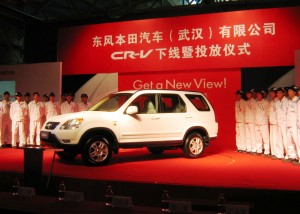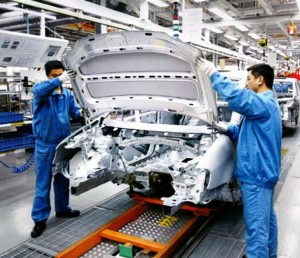
China's indigenous automakers are struggling to keep up with companies like Volkswagen, General Motors and others in its own market.
China is the world’s largest and fastest growing automotive market in the world, but the focus of the biggest Chinese policy makers, pundits and executives now is the well-being or fate of the country’s indigenous brands.
Some companies, such as Geely, are doing fine and governmental agencies, particularly local governments with a stake in the so-called state-owned enterprises, or SOEs, are doing what they can to assist the homegrown, according to information presented during the course of the two-day Global Automotive Forum, which was held last week in Wuhan, China.
China is clearly willing to use subsidies for energy-efficient vehicles, rationed parking stickers and anti-trust enforcement to help bolster the indigenous brands, which have have steadily lost marketshare during the past 18 months. In addition, a new study by the Boston Consulting Group found the more than 80% of the Chinese consumers who expect to buy a car soon prefer foreign brands.
Chinese officials have taken some relatively small steps to bolster the homegrown brands, which are feeling the heat from global automakers. Two-thirds of spaces on list of vehicles labeled preferred on a list of the most energy-efficient vehicles went to Chinese brands. China also has fined Western companies, among them Mercedes-Benz and Fiat Chrysler Automobiles, $200 million in recent months for anti-trust violations.

The Chinese government forced foreign automakers to build plants in China, like Volkswagen's plant in western China, to provide jobs for its citizens.
The authorities have targeted the aftermarket, which has grown quickly as the number of cars on the road in China has more than doubled in the past five years. Chinese officials at the conference defended the fines, saying they were designed to root out anti-competitive practices, such as price fixing, before they became commonplace in market that growing fast and ripe for exploitation.
In China used cars are sold on the internet, creating huge opportunities for e-commerce sites that are among the largest in the industry worldwide. But since Chinese car dealers can’t sell used cars, foreign brands, with their well-developed service parts networks, have a distinct advantage.
By and large, foreign companies, led by General Motors and Volkswagen, which hold about 25% of the Chinese market, have made a concerted effort to be model citizens. GM bowed to Chinese pressure and created a Chinese-only brand, Baojun, and Volkswagen in response to pressure from the central Chinese government, opened an assembly plant in far western China, hundreds of miles from the principal economic centers in China’s central and eastern or coastal provinces.
Despite the fact that GM, VW, Ford and BMW are gobbling up marketshare, Japan is often top of mind for China. The recent problems of the Japanese carmakers have been overshadowed by ongoing dispute over tiny spits of land in the East China Sea.
(Despite downturn China’s economy still strong. For more, Click Here.)
One way or another, the dispute is a major topic of discussion in the Chinese Press and China is now in the midst of a decade-long effort to document every single atrocity committed by Japanese troops stationed on Chinese soil. The study already runs to dozens of volumes, according to the English-language China Daily.
But Chinese officials are clearly have a watchful eye on the health of the indigenous brands and SOEs behind them.
Wang Ruixiang, chairman o the China Machinery Industry Federation, noted the automobile industry is now one of the “pillars” of the Chinese economy, employing more than 4 million people and supporting another 40 million jobs indirectly.
(Click Here for details about Ford’s decision to cut Focus EV price.)
He added the federation would like to see Chinese companies spend more on research and development and rely on innovation to match foreign competitors. Wang added the federation also would encourage what he described as a reorganization of China’s domestic industry.
China’s domestic carmakers also have to keep an eye on quality of the vehicles they build and using more automation would be a key component in that effort, he said. But Wang, as did other speakers, also indicated the federation wanted to see the indigenous brands build their reputations because it is important to China.
Twenty-five years ago, Chinese automakers were looking at a Russian company that made Ladas for some guidance on how to build a successful company, noted one speaker. But Lada has faded away and Chinese companies must pay attention to the need for greater fuel efficiency and the desires of the customers, according Zhu Fushou, general manager of the Dongfeng Motor Corp., which owns part of PSA Peugeot-Citroen and has joint ventures with companies such as Nissan-Renault and Kia. The company sells both light- and heavy-duty vehicles under its own brands.
(To see more about Ford’s plans to secure fifth truck title at SEMA, Click Here.)
Ultimately, China is rapidly becoming the most competitive market in the world, surpassing the United States. Anyone waiting for a collapse or rapid of consolidation could have a long wait.
The indigenous brands while behind foreign competitors in the minds of consumers still have access to capital, which has fueled the remarkable Chinese expansion during the past 15 years as the number of private cars in Shanghai jumped from 43,000 at the turn of the century to more than 1.4 million.
“The Chinese market is already the most competitive market in the world with something like 30 different brands and it’s only going to get more competitive,” noted Jay Kunkel, president of Lear Corp.’s Asia-Pacific Operations.
